In November 2009, seven men got off a bus in Monterrey, Mexico, and made their way through the crowded and chaotic downtown to the concrete box that housed the United States Consulate.
Inside, the men told a consular officer that they had been invited to work as janitors at the Sugar Mountain ski resort in Banner Elk, North Carolina. They had gone the previous season and were returning; all they needed were their new guest worker visas, which had already been approved, and they would be on their way north.
The Monterrey consulate is one of the world’s busiest, processing more than 400,000 visas each year, and it’s the single largest issuer of the kind the men were awaiting: H-2 visas, given to unskilled “guest workers” for temporary jobs in everything from tobacco farms to landscaping to shellfish peeling. The consulate cranks out an average of nearly 300 every single day.
But on this day, the State Department employee hesitated, then placed a call to the ski resort. It had been a warmer autumn than usual, and Sugar Mountain wasn’t yet open to the public; the consular officer was told that the resort needed snowmakers, not janitors. Stranger still was that the guest worker visa application, filed by a year-old company called Winterscapes, proposed sending nearly 250 Mexican janitors to two small ski resorts in the Blue Ridge Mountains that winter.
Something wasn’t right.
The visas were denied. And the consular official dashed off an urgent cable raising serious doubts about Winterscapes. Two months later, federal agents launched Operation Hammerlock, a criminal investigation that quickly grew, spreading over multiple states and encompassing several federal law enforcement agencies as its focus shifted to the country boy in North Carolina who helped line up the visas.
He lobbied Washington, worked the courts, and negotiated the underworld of Mexican recruiters to provide customers across the country the cheap foreign labor they wanted — and build himself a vast and lucrative empire.
That man, a former state employee by the name of Stan Eury, is widely credited as the largest importer of H-2 guest workers in American history: a legal coyote who saw in the complicated crenellations of federal immigration law a way to expand a little-known program into a giant. He lobbied Washington, worked the courts, and negotiated the underworld of Mexican recruiters in order to provide customers across the country the cheap foreign labor they wanted — and in the process build himself a vast and lucrative empire.
Living unobtrusively in Vass, North Carolina, playing drums in his church band, and providing devoted care to a disabled daughter, Eury, 63 years old, has kept a relatively low profile in the immigration debates that have roiled the country. But over more than a quarter of a century, he has been responsible for procuring hundreds of thousands of Mexican workers on H-2 visas for farmers, landscapers, seafood processors, restaurants, golf courses, concrete companies, and ski slopes. There are strong indications that some of those workers never returned home, as required by law. And at virtually every step — from recruiting the workers, to busing them north, and even to charging them for baggage — Eury’s businesses collected a fortune in fees from all concerned.
Perhaps most importantly, he became the guest worker industry’s dominant power broker, an implacable visionary who helped shape the program into what it is today. Thousands of companies directly employ H-2 workers, and giants such as Wal-Mart and the U.S. Forest Service have relied on their labor indirectly by buying from or contracting with those companies. Just this month, Congress voted to dramatically expand parts of the visa program.
But as previous BuzzFeed News stories have shown, employers frequently exploit foreign H-2 workers, stealing their wages, housing them in squalid conditions, and even endangering their lives. At the same time, many companies use the program to avoid hiring qualified Americans, who by law are are supposed to get first crack at those jobs. Officials at the U.S. Department of Labor say the H-2 program is “part of a wider immigration system that widely acknowledged to be broken.” They claim they have only limited power to fix problems and protect workers, foreign or American.
Overshadowed by the larger immigration debate, the H-2 program is virtually unknown to the general public. But one major constituency champions it: American business, which prizes the steady supply of cheap and pliant labor. The entire program, from its expansive reach to its weak regulation, has been shaped by the businesses that benefit from it. No one personifies that influence more than Stan Eury.
Stan Eury
He has waged and won battle after battle in the courts and in Congress to push wages down, to reduce regulation, to bat back worker protections, and to discourage and disqualify American job seekers. Most importantly, he has fought and won to maintain the flow of Mexicans — and money.
In 2014, more than 150,000 workers came into the country on H-2 visas, far more than the roughly 13,500 that came in the year before Eury first helped a North Carolina farmer look to Mexico for its staffing needs. Last year, Eury’s companies won approval for more than 20,000 visas, charging clients roughly $1,000 for each one.
Eury has built up an ample array of critics and former friends who say he has made a mockery of an already broken immigration system. In addition to his work as a labor broker, some of them claim, he also procured H-2 visas outright for people for whom no jobs were waiting, even people just looking for an easy way to get into the United States.
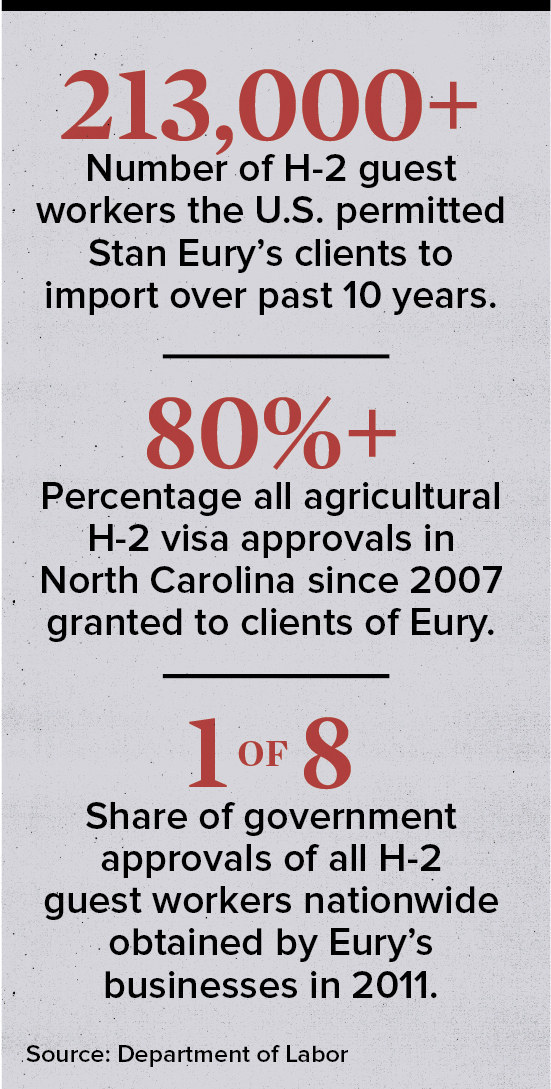
But Eury’s tactics have also earned him boundless loyalty from the thousands of employers who became dependent on the guest workers he was so good at getting. Even after federal investigators alleged that Eury and companies he created were defrauding clients by charging them millions of dollars in spurious fees, few, if any, customers walked away.
All that seemed to matter was that Eury, more than anyone else, could get them what they wanted: cheap, abundant, uncomplaining, desperate, pliable, dependable foreign labor.
Standing on his front porch last month in worn jeans, brown slip-ons, and a gray sweater, Eury eagerly discussed the H-2 program and his role in its growth, noting that he has spawned many imitators.
“Back in the day, there were no agents except us. And it became something much bigger,” said Eury, who talked enthusiastically for three-quarters of an hour before his wife, Susan, summoned him to end the conversation.
Before disappearing, however, Eury waved off talk of the government’s investigation. “I had a long and contentious relationship with the Department of Labor,” he said, squinting. “This is political.”
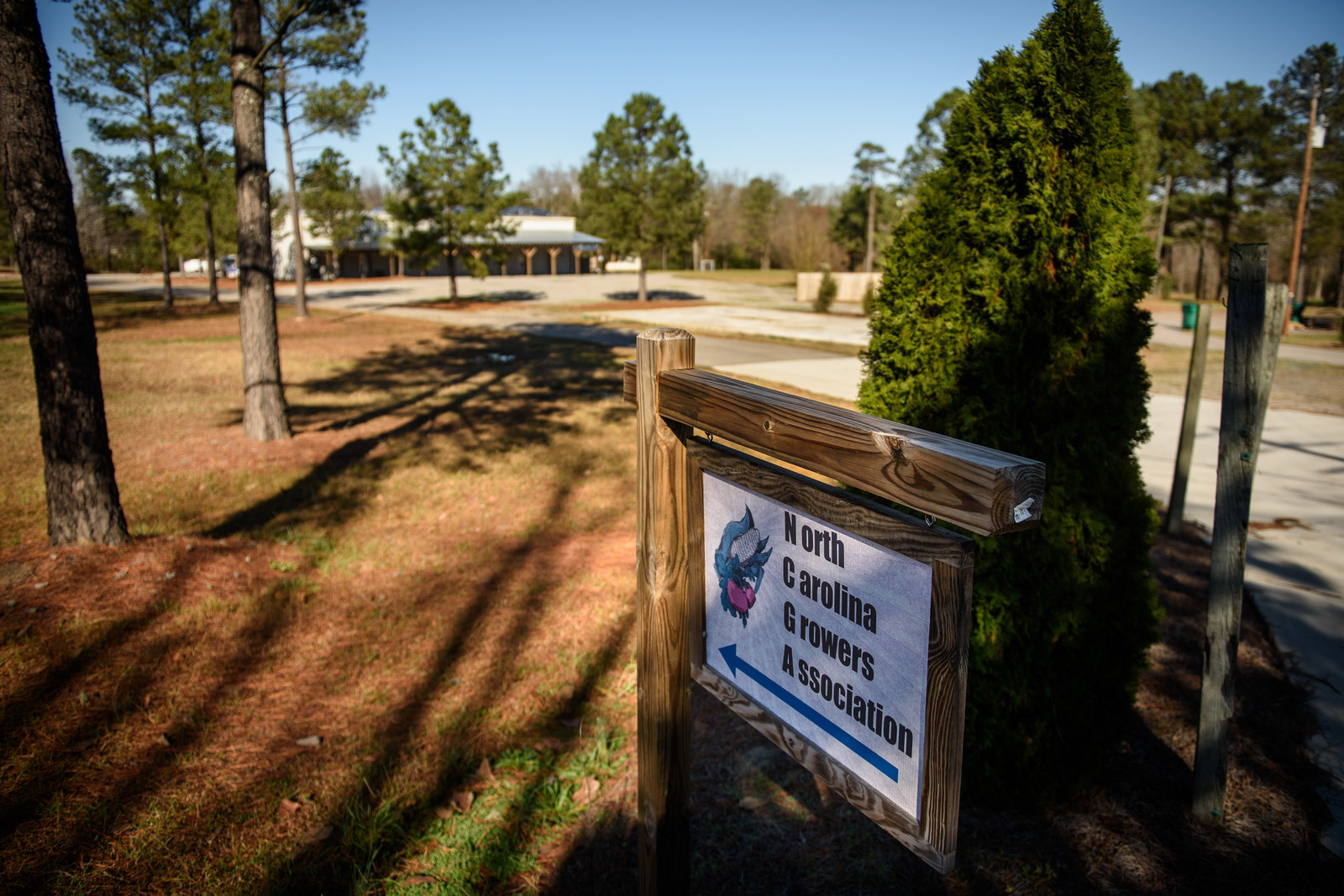
A BIT OF “DUMB LUCK”
The business that would do more than anything to influence the shape of America’s guest worker program was born from a drug bust.
It was a Wednesday afternoon in the hot middle of July 1989, and Moore County Narcotics Detective Sergeant D.T. Monroe and his partner had rolled out to check on a tip that almost 200 marijuana plants were growing on an unsuspecting farmer's land.
The officers found the drugs and then, to their surprise, heard voices amid the rustle of the leaves. There, in a bit of “dumb luck,” Monroe said, they found Craig Stanford Eury Jr., whom everybody just called Stan, with his friend and colleague Ken White, watering their contraband crop.
Ten minutes earlier or later, Monroe would have missed them and been forced to dig up the plants himself. Instead, Monroe arrested Eury and White and forced them to help with the work. The department also seized the Subaru the two had driven to the field, Monroe said. “We used it for a long time for undercover work.”
Eury — who just weeks earlier had signed a pledge to abide by his employer’s “Policy for an Alcohol and Drug Free Workplace” — was able to escape serious legal trouble. But he lost his job as a North Carolina rural manpower representative, a kind of agrarian matchmaker who helps farmers find seasonal workers to plant, tend, and harvest their crops.
For a father of three small children, including a 7-year-old daughter severely disabled by cerebral palsy, losing a $24,000-a-year government salary might seem like a crisis. But Eury turned it into an opportunity.
Stan Eury and his wife Susan.
A month after being fired, Eury founded what would become his biggest and best-known outfit, the North Carolina Growers Association. The group’s articles of incorporation pledged it would “operate as an agricultural trade association,” helping its members “by providing assistance in the areas of labor management, legislation, marketing and other such related activities.”
Eury would do essentially the same job he had done for the state. Except this time, the workers would come from Mexico on H-2 visas. And Eury would collect fees on every one. White soon joined him in the venture.
Their timing couldn’t have been better.
Three years earlier, Congress had passed the Immigration Reform and Control Act, which made it illegal to knowingly hire an “unauthorized alien,” and which set the stage for massive government raids on employers, including farmers who had long relied on undocumented workers.
He has won battle after battle to push wages down, to bat back worker protections, and to discourage and disqualify American job seekers. Most importantly, he has maintained the flow of Mexicans — and money.
To encourage legal employment, the bill also resuscitated the little-used H-2 guest worker program, which dated from a generation earlier, creating a special category just for agricultural workers, H-2A, and another for nonagricultural workers, H-2B. Critically, it also contained provisions for special associations that could apply for visas for all of their members at once.
Rather than relying on local workers who might make demands about their working conditions, or risk hiring undocumented workers in an era of immigration raids, farmers could now get government permission to bring in foreign laborers who were desperate for the work. Under the program’s rules, guest workers could stay here legally for up to 10 months, but they were tethered to the employer that sponsored their visa and could not seek any other job. When their visa expired, they had to leave the country.
The North Carolina Growers Association offered busy farmers a turnkey guest worker experience. It would serve as a joint employer, applying for all the visas its members wanted en masse, busing the workers across the border from Mexico, and then moving them from farm to farm as needed. And in addition to a membership fee, the growers association could charge for each and every visa, rolling in the cost of transportation and a nice chunk of overhead.
In 1990, the North Carolina Growers Association brought in its first batch of visa holders: 400 workers for a handful of farmers, more than double the number that all the farms in North Carolina combined had imported the previous year.
By 1999, the association was getting approval from the Labor Department to bring in 10,000 or more workers a year.

On top of his own familiarity with North Carolina’s agricultural employment regulations, Eury hired a number of former state officials who brought their own knowledge and connections to his business.
His team included Jay Hill, another rural manpower representative with agricultural ties thanks to his father, a prominent tobacco and sweet potato farmer in the state. He rounded out his inner circle with Lee Wicker, a graduate of the University of North Carolina, Chapel Hill, who had been working as a rural manpower representative, and Mike Bell, a Spanish speaker who had lived in Latin America and had also been working in the same agency.
Perhaps Eury’s most important contact was the man he didn’t hire. William “Bubba” Grant, an avid East Carolina University football fan and the brother of an actress who played a pageant official in the 2006 film Little Miss Sunshine, had been Eury’s direct subordinate when he worked for the government.
Grant took the job Eury vacated and rose quickly; by the mid-1990s he was running the whole division. Every H-2 visa application in the state crossed his desk, which made him a great person to know, particularly since the North Carolina Growers Association often requested more than 80% of all agricultural guest worker visas in North Carolina. For years, employers in North Carolina obtained approvals for more such guest worker visas than employers in any other state.
By law, jobs must go to qualified American applicants before any H-2 workers can be hired. But Frank Gore, a former Rural Manpower Representative who retired in 2009, said it seemed to him that state regulators didn’t prevent the growers association from passing over American workers in favor of cheaper, more pliable foreigners.
Grant did not respond to requests for an interview. A spokesperson for the North Carolina Department of Commerce said the agency is in compliance with federal law.
Gore said he noticed that many of his colleagues did not even bother referring local workers to North Carolina Growers Association jobs, despite their obligation to do so. He said he quickly discovered one of the reasons why.
By law, jobs must go to qualified American applicants before any H-2 workers can be hired.
When he called the association to recommend a U.S. job applicant, he said, he encountered “a very long process.” Suspiciously long: Interviewers, often Eury or White, would ask “questions that had absolutely no bearing on what the job was” in an effort “to discourage the worker,” Gore said. “The workers got tired,” he recalled. “They said, ‘I’m not applying for a high-security job. I’m just wanting to work in manual labor.’”
Gore said he recorded some of the interviews to document how unusual they were and handed them over to state auditors. He eventually concluded that Eury and White were sending a message: Don’t refer domestic workers to the North Carolina Growers Association or its farms. “It was easier for me to refer a worker to a skilled position in a factory than to refer a farmworker,” Gore said. “If they hired one American worker, that was one less worker they could bring up from Mexico.”
Hill, speaking for the grower’s association, wrote in an email, “We hire every qualified domestic worker who applies for our jobs.”
But with few if any local job applicants to worry about, the growers association was free to bring in foreign workers by the thousands. In the 12-month period starting July 2014, for example, the growers association got permission to import more than 12,000 guest workers for jobs in North Carolina. But despite such a massive number of job openings — ones that Americans are supposed to get the first shot at — state workforce officials referred only 103 domestic applicants to the association’s farmers during that period, according to the North Carolina Department of Commerce.
In 1994, sensing more opportunity, Eury opened a new venture, the International Labor Management Corp., to focus on H-2A visas for farmers outside of North Carolina and H-2B visas for employers in other industries. Soon it was helping clients gain approval for thousands of visas every year.
Other companies controlled by Eury have capitalized on additional corners of the visa market, making money off transportation and recruiting.
By 1999, Eury’s businesses were responsible for bringing in more than half the agricultural guest workers in the country. Even with more competition, in 2011, he was still responsible for securing one in eight of all H-2 guest worker visa certifications.

“IT SEEMED LIKE HE WAS ALWAYS IN A FIGHT”
Vass is a little country town. Its lone stoplight meters traffic coming off Route 1 against the trickle pulling out of the Piggly Wiggly parking lot. But the silence is frequently broken by the roar of long-haul buses marked “Transportes del Norte” pulling into the North Carolina Growers Association headquarters. Not 200 yards away is the front door of Eury’s modest two-story house, which has a pool in the back and a beat-up old GMC pickup parked out front with a bumper sticker that reads “I Pray. Get used to it.”
Stepping off the bus after the long ride from the border, guest workers enter the growers association's nondescript warehouse — and find an almost Disneyesque re-creation of a two-story Mexican hacienda, featuring faux adobe walls, rustic beams, and an imposing balcony on which a Spanish-speaking association official, often Hill, barks instructions at the crowd below.
Soon the workers will be loaded onto different buses and driven to the far corners of North Carolina, where they will pick blueberries, pack cucumbers, pull flowers off leafy tobacco plants, or topple Christmas trees. Many workers stay from early spring until winter, jumping from crop to crop, farm to farm, as the harvest seasons progress. And when the work is finally done, the Mexicans are brought back to Vass to stare up once again at the man on the hacienda balcony, then pile into the “Transportes del Norte” buses for the long drive back to Mexico.
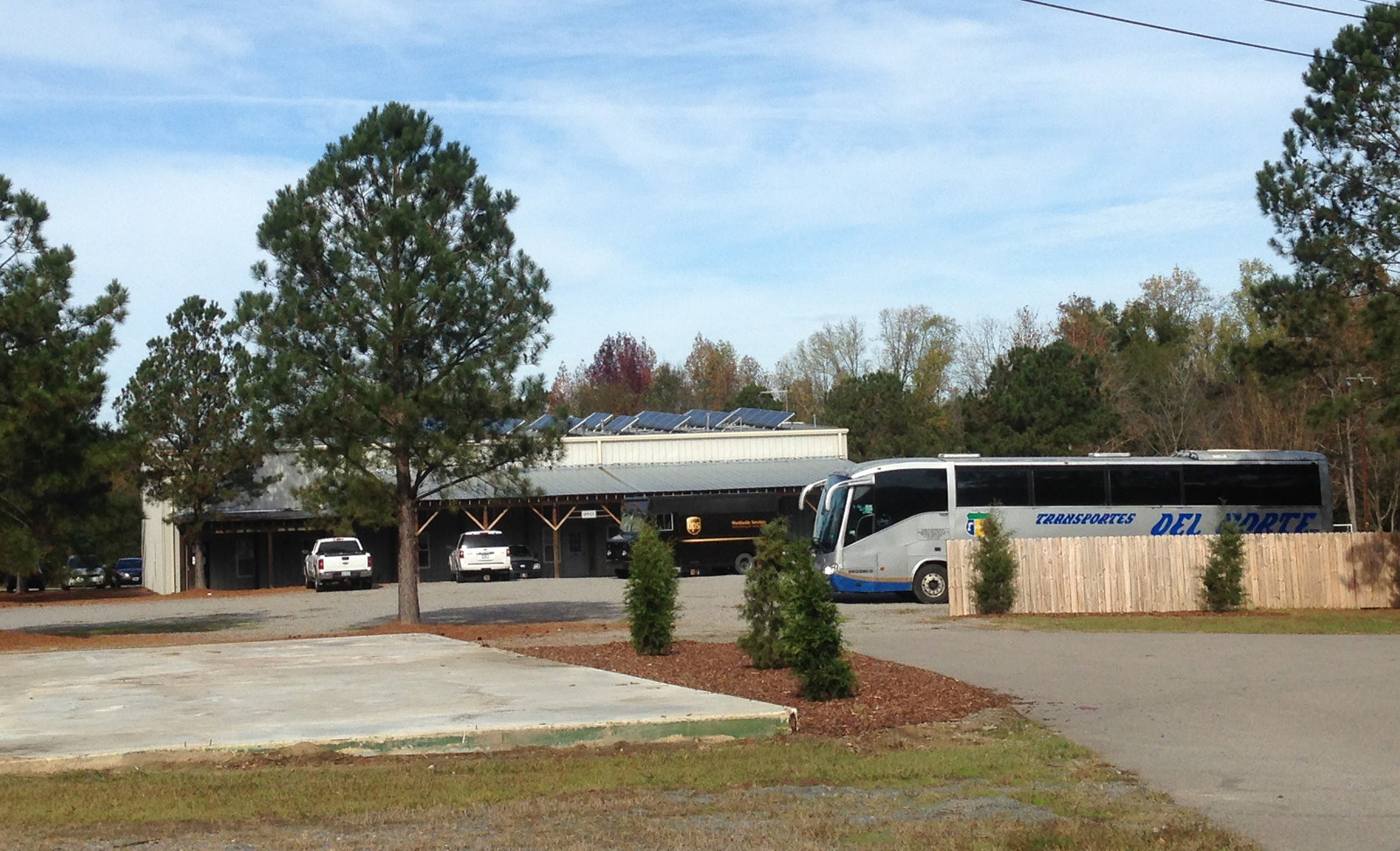
Eury’s is an astonishingly efficient machine. In a typical year, his companies meet the labor needs of clients across more than 20 states. Every year, he brings in thousands upon thousands of workers, most of them young men, virtually all of them Mexican, tracking their movements, phone numbers, home addresses, past jobs, and job performance in massive databases. It is a logistical miracle, one informed by his deep and detailed understanding of the H-2 program.
This is a man whose idea of a good time is combing through the Labor Department’s online database of visa certifications, looking for unusual orders, new trends, new loopholes to exploit. “I know it from on the ground,” Eury said in the interview in front of his home. “I don’t just read books and talk about it in theory.”
That degree of knowledge has been a fundamental part of Eury’s edge, of what allowed him to build his little association into a vertically integrated transnational supply chain featuring human beings as the product.
Equally critical, however, has been Eury’s knack for winning at any cost, massaging favors from from state and federal bureaucrats, ironing out innumerable little problems with growers, and assailing competing visa agents and anyone else who got in his way.

Current and former state employees recall Eury setting that tone almost immediately, bringing an aide to the powerful Sen. Jesse Helms to one of Eury’s first meetings with regulators. Eury, who served on the Vass town council, and his deputy, Wicker, have testified before Congress many times, speaking not just for H-2 agents but for farmers in general, and the two have sat on numerous influential industry boards.
The two men at times have been brusque, even belligerent, demanding immediate responses and lashing out when someone tried to stymie them. In a February 2008 email to a Labor Department official, for example, Wicker demanded a meeting and added that “we do not like to be quarrelsome even though we are exceptional at it.”
Eury is a generous political donor, almost entirely to Republicans. In 2000 he formed the North Carolina Growers Association Political Action Committee, which he used to bundle thousands of small contributions to help elect the state’s labor commissioner, Cherie Berry, and Steve Troxler, a tobacco farmer who rose to be agriculture commissioner.
Eury later created “The Truth Squad,” a political fundraising committee that ran ads pushing his political agenda.
In 2006 he gave Graham Boyd, an official at the Tobacco Growers Association of North Carolina, $25,000 to fund a new non-profit to oppose legislation that would have paved the way for undocumented immigrants to achieve citizenship. Then Eury sued him, accusing him of lobbying in favor of amnesty and demanding his money back.
“The guy has a him-against-the-world mentality,” said Boyd, who said he never switched sides on immigration and that Eury eventually dropped the suit. “You’re either with him or against him.”
Worker advocates were against him. They sued many times on behalf of aggrieved H-2 workers who complained of wage theft, discrimination, dismal living conditions, or filthy drinking water.
His efforts, he added, felt like spraying “gas on a hornet’s nest of Legal Aid lawyers. They didn’t all die.”
Eury pushed back, posting a banner on the wall of the North Carolina Growers Association that warned, “Servicios Legales Quieren Destruir el Programa H-2A” (Legal Aid Wants to Destroy the H-2A Program), and asking a congressional committee to end all funding for public interest lawyers nationwide, even those whose work had nothing to do with farming.
In 1998, Eury got his hands on a videotape that showed Legal Aid attorneys interviewing H-2 workers in Mexico, which he said violated the terms of the group’s federal funding. Taking the tape to Washington, he provoked a political firestorm and got North Carolina Legal Aid’s farmworker program defunded.
Still, worker advocates continued to sue Eury and his clients, costing them millions of dollars. “They hammered us,” Eury said outside his home, his hands in his pocket. His efforts, he added, felt like spraying “gas on a hornet’s nest of Legal Aid lawyers. They didn’t all die.”
In 2004, his growers association reluctantly agreed to let the Farm Labor Organizing Committee, an agricultural union, represent guest workers in collective bargaining.
It seemed like a loss for Eury and his clients, but in many ways it ended up benefiting them. Rather than a court, it’s now the union that handles worker complaints. Immediately, the stream of lawsuits that the growers association and its farmers were once forced to litigate stopped.
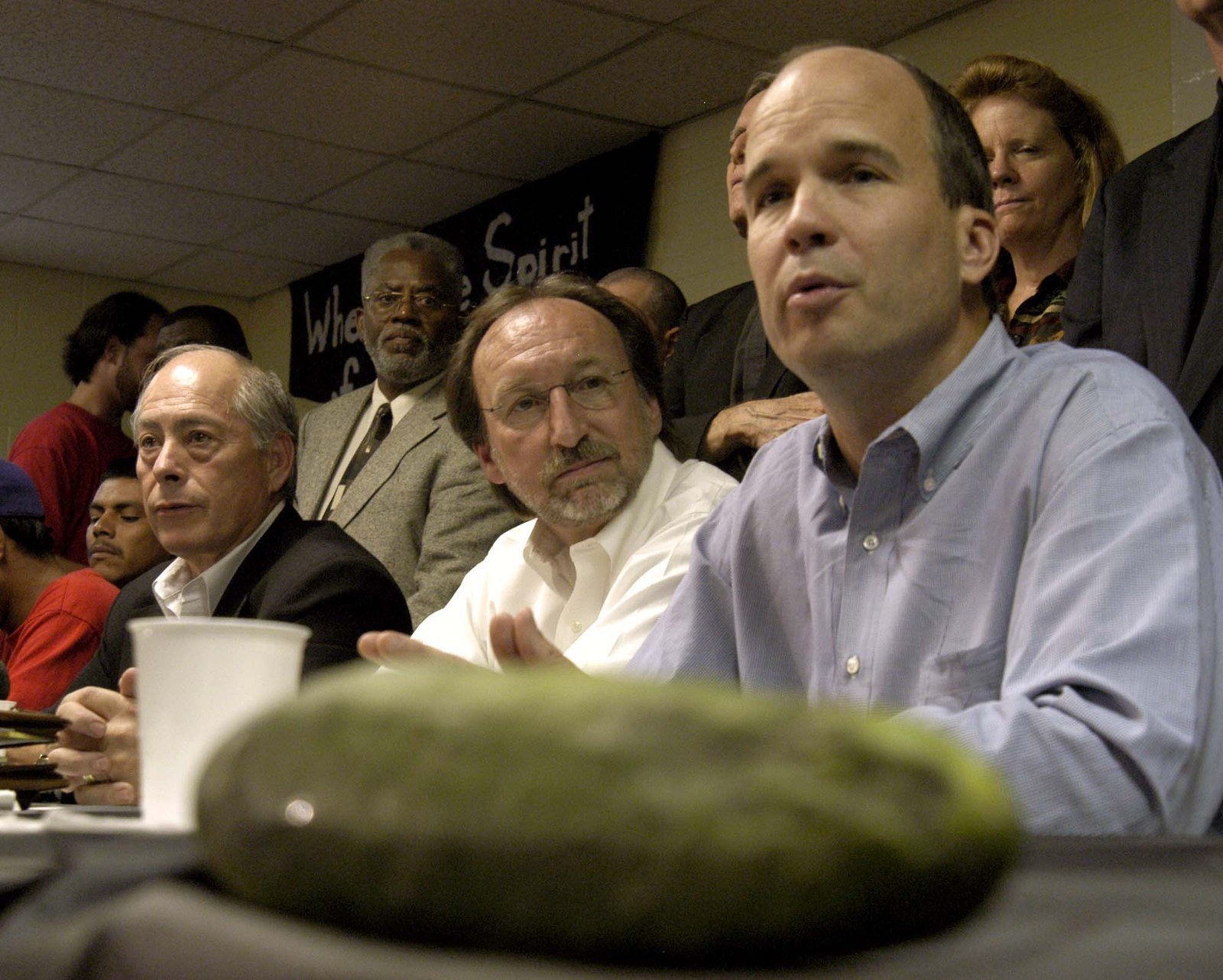
And the agreement had another side benefit: It gave Eury and his association an opportunity to present themselves as “the most progressive program in the nation,” a development that infuriates some worker advocates.
Perhaps his greatest victories, however, have come from using the courts to shape existing regulations to his advantage.
Sued by female workers who said their housing was inadequate, Eury won an appeals court precedent that partially shielded his clients from discrimination laws, allowing them to hire only men for some jobs. He later won exemptions from age discrimination statutes as well, allowing his clients to cherry-pick young workers to come work in the U.S.
In 2009, the Labor Department issued sweeping new rules that would raise H-2A workers’ wages, increase travel reimbursements, and require more recruiting of domestic workers. The added cost could have curtailed the H-2 program — and Eury’s business. He sued.
Federal Judge William L. Osteen ruled in Eury’s favor, forcing the secretary of labor to issue a new set of rules.
Then Eury sued to stop those rules as well.
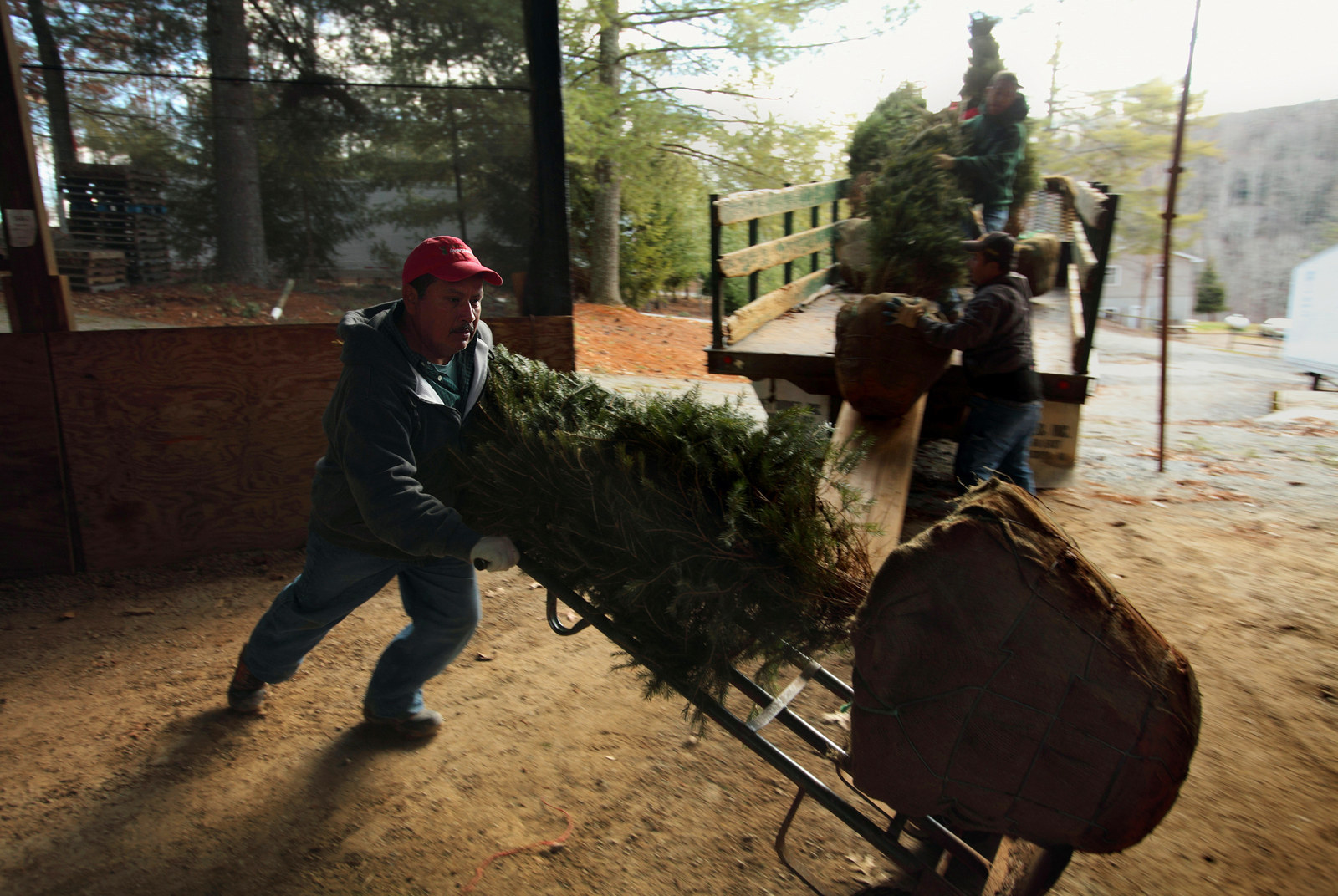
“He was a fighter," said Stanley Porter, a 65-year-old former farmer. "It seemed like he was always in a legal fight.” Eury helped Porter use the courts to win an arcane but important battle: getting Christmas tree farming reclassified from a non-agricultural job to an agricultural one. The distinction is crucial, because under the provisions of the H-2 visa program, nonagricultural guest workers get overtime pay, but agricultural guest workers do not. By successfully arguing that cutting down Christmas trees should not be treated as other forestry jobs but instead as crop farming, Eury saved Porter and other growers potentially millions of dollars — at the workers’ expense.
Over the decades, Eury has also used the courts to settle personal scores. He twice sued his former employer, the state of North Carolina, after he was fired for the marijuana bust, seeking unpaid overtime and claiming he should have been eligible for unemployment. Arguing that the $250,000 worth of drugs was for personal consumption, he won a ruling that the state should give him back his job, though he never went back to it.
Many sources reached for comment declined to speak, expressing concern that Eury would sue them. “Stan made a comment one time while picking another battle,” Graham Boyd recalled. “He said, ‘That’s our mentality, we’re street fighters.’”

A HEAT INDEX OF 118
By 6 a.m. on the morning of July 19, 2005, Pablo Ordaz was at work in the fields of Danny Walker’s tobacco farm in Person County, North Carolina. The National Weather Service warned of a heat index well above 100, cautioning against exertion in the sun. But Ordaz, 40, was determined to provide for his family back in Mexico.
Walker’s workers called him “El Diablito,” or little devil. They said he didn’t like to permit water breaks and was known to yell if anyone tried to rest or sneak a sip. Hour after hour, Ordaz and the other workers laced their way through dense rows of tobacco, removing the broad, sweet-smelling leaves and depositing them in a trailer pulled by a tractor.
Ordaz was feeling terrible. During a short break at about 10:00, he sunk down onto a makeshift wooden bench under a shade cover between two tobacco barns. He held his head. At one point, he removed his shoes and socks and doused his feet with water. Then he disappeared.
He wasn’t at the trailer where the workers slept that night. And he wasn’t there in the morning either, even though his passport and all his belongings were.
Walker made no attempt to look for him. Instead, he picked up the phone and called the North Carolina Growers Association. He said Ordaz had “run off” and requested a replacement H-2A worker be sent in his place.
It was two more days before the buzzards gathered.
It was two more days before the buzzards gathered and began swooping in great, slow circles near the trailers where the workers lived.
Due to the decomposition of Ordaz’s body, the coroner couldn’t determine with absolute certainty the cause of death but ruled that he could have died of heatstroke. The heat index in the sun at 10:40 a.m., when Ordaz was last seen alive, was 118 degrees. The North Carolina Division of Occupational Safety and Health fined Walker Farms, noting that workers said Walker did not give them enough time to drink water and yelled at them if they did.
Walker could not be reached for comment. After the incident, his attorney wrote to the North Carolina Department of Labor that “my client believed that the death was just a simple heart attack” and that he has “always professed that there was always plenty of water available.” He added that “this man’s death was not as a direct result of my client not providing water or assistance. In fact, he did not know of this man’s death until quite a while after it happened.”
The North Carolina Growers Association has continued to get visas approved for Walker Farms, more than 90 since Ordaz died, including 13 this year.
Baldemar Velásquez, a union leader, said farmers have forced workers to labor when sick or tried to fire them when they couldn't keep going at a fast pace, even after 12 days without a break. He said Eury often takes the farmer's side reflexively.
In multiple investigations by the Labor Department, North Carolina Growers Association members have been found to violate federal worker protection laws. In a 2001 case, for example, investigators probed 24 different growers association farms, finding violations ranging from terrible housing to unpaid wages, affecting 215 workers. Regulators issued a $403,000 fine.
"Sometimes farmers make mistakes and bad choices, and the NCGA always tries to correct things and help growers get into compliance," Wicker said in an interview. The growers association and its farmers have vastly improved working conditions in recent years, he added, in part due to the collective bargaining agreement with the union that allows farmers to “identify and solve problems quickly.”

“WE NEED TO ORDER MORE TACOS”
The morning after Easter 2007, the body of Santiago Cruz, a young organizer for the Farm Labor Organizing Committee, was found in the union’s Monterrey, Mexico, office, his hands bound, union officials said. He had been brutally beaten to death. His blood stained the floor and walls.
Velásquez, the head of the farm labor group, said he is convinced the murder was in retaliation for the work Cruz had been doing: letting workers know that, under the collective bargaining agreement, they no longer had to pay recruiters to put their names on visa lists — fees that often ran to $400 and at times far more. Multiplied across the tens of thousands of workers coming into the U.S. every year, the money added up quickly. Mexican police, meanwhile, said that Cruz was killed after an argument over visas he himself was allegedly selling.
Either way, the killing, while extreme, illustrated the cutthroat world of labor recruiting in Mexico, where networks of recruiters demand money from impoverished workers desperate to win a visa.
There has never been a suggestion that Eury or his team was involved in any kind of violence. But he proved adept at navigating the underworld of labor recruiting south of the border and making money off it. Mike Bell, a fluent Spanish speaker and former Peace Corps volunteer, said Eury dispatched him to Monterrey in 2000 to open a recruiting and logistics operation: Manpower of the Americas, later called Consular Solutions Inc., or CSI. “My life was threatened quite a few times by recruiters that I had to fire” for overcharging workers, Bell said in an interview. Despite the risks, the company found workers, helped them get visas, and sent them across the border. The money was too good not to.
“My life was threatened quite a few times by recruiters that I had to fire.”
Bell said that much of CSI’s revenue flowed directly to Eury — something Eury kept quiet. Indeed, the internal workings of CSI reveal much about how Eury ran his sprawling business operation.
The hub of his empire was his original company, the North Carolina Growers Association, which in its founding document stated that it would operate as a 501(c)(3) nonprofit and that “no part of the net earnings of the Corporation shall inure to the benefit of any officer, director or member of the Corporation.”
On its website, which comes with a .org domain, the association has professed repeatedly to be a “non-profit.” Yet IRS records show that the association was never granted federal tax-exempt status, the designation awarded to a typical non-profit. (Hill, of the growers association, said it stopped seeking tax-exempt status after “multiple denied attempts.”) As a result, Eury did not have to publicly report how much money flowed from farmers, through the growers association, directly to him.
The association did register as a nonprofit at the state level — a move that shielded it from having to make basic disclosures about who runs it. In North Carolina, nonprofits, unlike for-profit companies, are not required to make annual reports to regulators. There's even a term for organizations that are registered in this unorthodox way: taxable non-profits.
Eury also controlled a variety of satellite companies that benefited from the North Carolina Growers Association — sometimes directly, when the association cut them checks, and other times indirectly, when it sent them business. But Eury frequently kept his involvement in these companies quiet, court records and company documents show, obscuring what appears to have been brazen self-dealing.
For years, the growers association had contracted with an independent recruiting agency to find workers in Mexico. But in 2000, Eury decided he wanted that part of the business for himself, Bell said. So, together with Wicker and White, Eury set up CSI — and presented it as an independent company.
“That’s what they wanted their clients to believe,” said Bell. But in truth, Eury controlled the business, Bell said. For “every single worker who went through the system," Eury and his partners "had to get their cut.”
CSI did all the recruiting for Eury’s clients, Bell said, charging each worker about $160 in fees, most of which was wired to bank accounts controlled by Eury. Bell, who ran the company for nine years and served as a consultant to it for another three, said his annual share of the pot reached as much as $650,000.
“They referred to Mexicans as 'tacos,'” Bell said. “They’d say, ‘We need to order more tacos.’”
In some years, Bell said, CSI would recruit as many as 18,000 workers. Eury and others talked about the recruiting process as if they were ordering lunch, Bell said. “They referred to Mexicans as tacos. They’d say, ‘We need to order more tacos.’”
In 2009, when the Labor Department instituted new rules banning recruiting fees, Eury adapted. He created a new company — called the Application Services and Administrative Program, or ASAP — that charged employers up to $99 per visa, allegedly to cover recruiting costs.
In slightly less than four years starting in 2009, federal investigators said, ASAP took in nearly $8.4 million in fees from the North Carolina Growers Association and clients of two other visa agencies controlled by Eury, Wicker, and White.
Eury, for his part, did not broadcast to his clients that he was behind ASAP — or that he and White had founded a supposedly independent transportation company that was charging to arrange transport of workers from Mexico.
In the interview, Wicker, 44, expressed remorse for his role in ASAP, saying simple greed was “an accurate way to describe” his intentions, and calling the company “a scheme to make money off recruiting.”
According to court documents, members of the North Carolina Growers Association board include Len Wester, Denny Lee, and Rick Lasley. None could be reached for comment. Eury referred questions about the association’s structure to Hill, a solidly built man with a goatee who, in a brief interview outside its offices last month, said Eury no longer was an employee of the association.
Late this year, the association took down its website, leaving it to say: “This site is under construction. Please check back later.”
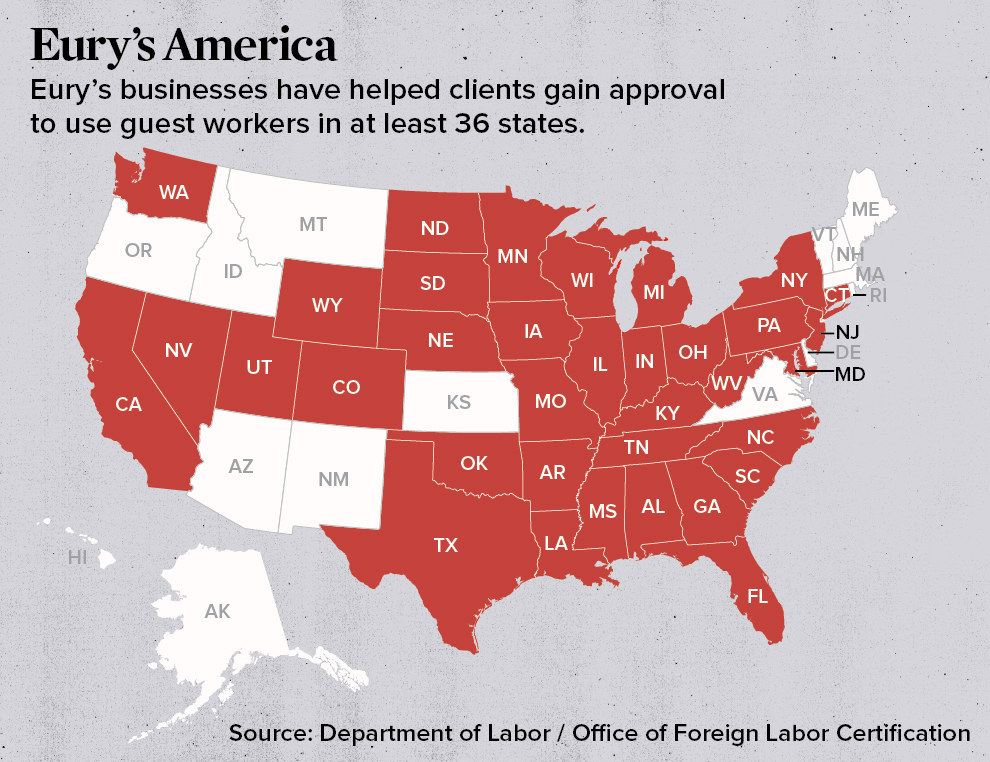
WHERE WERE THEY ALL GOING?
Throughout his 31-year career as a rural manpower representative, Frank Martin felt it was his duty to scrutinize applications to bring in foreign H-2 workers, in case some of the jobs in question could be filled by American workers instead.
Nearly every time he paged through the applications from Eury’s North Carolina Growers Association — applications that often ran dozens of pages long, requesting more than a thousand workers for scores of farms all at once — he’d notice “irregularities,” he said. Farms that had just mechanized their production requesting twice as many workers as the previous year. Growers that he knew had stopped cultivating tobacco suddenly asking for a dozen tobacco harvesters. And, most remarkably, requests for H-2 workers from farms that didn’t even exist.
“You had outright bogus, totally inflated orders,” said Martin, a rangy former basketball player and avid fisherman, sitting at his kitchen table in Wilson, North Carolina. Where, he began to wonder, were all these extra people going?

He said he concluded that Eury was bringing in hundreds or even thousands more people than his clients actually needed each year, people who paid handsomely for their visas south of the border and then simply vanished into America.
In 2001, Billy Green, a state official charged with advocating for farm workers, filed a formal complaint to the Department of Labor pointing out, among other things, that the North Carolina Growers Association's visa orders contained requests from growers “who not only did not employ H2A workers but did not even intend to apply for foreign labor.” Other farmers, he wrote, told him they requested fewer workers than the number listed in the paperwork and were “taken aback” when they learned of the discrepancy.
The Labor Department’s Office of Inspector General launched an investigation, eventually concluding in a 2004 audit report that the growers association was padding its orders. Nearly 30% of its growers reported that the association put in for more workers on their behalf than they had in fact requested.
In addition, investigators found that over the course of a year more than half of the workers brought in by Eury abandoned their jobs, and that there was no way to tell how many of them ever returned to Mexico as required by law. “Our research found no reliable method to measure the extent that worker abandonments contributed to illegal immigration,” the report said.
“You can pay a coyote and maybe die in the desert, or you can pay Stan Eury and ride in air-conditioned comfort all the way to North Carolina.”
Martin, the former state official, said Eury’s program may have contributed to illegal immigration into the United States.
“Put yourself in place of these workers,” he said. “You can pay a coyote and maybe die in the desert, or you can pay Stan Eury and ride in air-conditioned comfort all the way to North Carolina.”
Despite the Inspector General’s findings, Martin, another former state official, and a current one all say the order padding continued. The Labor Department declined to comment on whether it took any action based on the report.
In the interview on his porch, Eury denied that workers were using his program as a way to enter the United States and stay as undocumented immigrants.
He conceded, however, that when a worker walked away from a job, the North Carolina Growers Association still benefited because it didn’t have to provide the return transit for which it had already collected payment. “Oh, we keep that money,” he said.

AN ALLEGATION OF FORGERY
Even Eury’s fiercest foes note that he is staunchly devoted to his family.
His second child, now 33, was born with cerebral palsy, and former employees of Eury recall that he’d bring her to the office with him. At lunch, he would gently feed her while eating his own food on the margins. When she had seizures, he’d drop whatever he was doing to lift her out of her wheelchair and cradle her like a baby.
“Oh, God, he loved that child with everything,” said one former employee.
He also has cared for his widowed mother, now 90 years old, and gave his two other children jobs in his business, making his eldest child, Sarah, president of International Labor Management Corp., another of his visa agencies. That decision would prove fateful.
Sarah, 35, who goes by her married name, Farrell, started as the company’s head of marketing. A mother of two with a passion for design, she was made the company’s president in 2008, overseeing a staff that included her husband, Dan, as well as her younger brother, Craig, who joined after earning a degree in exercise science. Through her lawyer, Farrell declined to comment.
A big chunk of International Labor Management's business was H-2B visas, which unlike the visas for agricultural work can be used by industries as varied as landscaping, restaurants, seafood processing, and forestry. The program also has a different set of rules governing recruitment, wages, and enforcement — including a cap of 66,000 visas a year. International Labor Management was a major player, helping clients get approval for as many as 5,000 visas a year.
In 2004, for the first time, the federal government announced that the H-2B visa cap had been reached. So International Labor Management started finding ways around it. In 2006 it filed a visa application for 110 H-2B workers purportedly on behalf of a landscaping company. The government later alleged that the signature of one of the company’s managers had been forged.
The company started submitting more problematic visa applications, investigators alleged. In 2007, they said, it filed applications for 20 landscape workers on behalf of a company that did not do landscaping. And in April 2008, federal agents said, Farrell showed the owner of Miller’s Restaurant in Kill Devil Hills, North Carolina, how to evade the H-2B cap by saying he needed agricultural laborers. That type of foreign guest worker, unlike the kind allowed to work in a restaurant, is not subject to any limits.
In the following months and years, International Labor Management would bring in hundreds of workers under similar false pretenses, investigators charged, swapping them between jobs and classifications and leaving a trail of phony paperwork. According to federal agents, Eury’s take from the scheme was at least $1.12 million.

THE BUSINESS ABOUT THE SNOW
Only 10 minutes down Route 1, Southern Pines — the town where Sarah Farrell lives — is as genteel and refined as her father’s town of Vass is barebones and rough. The town of 12,000 draws tourists from all over the world who come to golf at nearby Pinehurst, and its shopping district oozes an upscale Southern charm. It’s the kind of place where a hot asana yoga studio is perched above a classic one-screen movie theater, just down the street from a combination Christian bookstore and fudge shop, with a basement museum dedicated to hand tools, taxidermy, and creationism.
Through a venture called Beaver Path Enterprises, the Eury family snapped up at least 18 houses in Southern Pines between 2004 and 2014, with no record of mortgages on file for any of them, suggesting all-cash transactions. It also acquired properties elsewhere in North Carolina — including acreage in the Blue Ridge mountains, and, in the next county over, a half-million dollar alpine chalet.
Farrell and a friend maintain a “home decor, historic renovation, and lifestyle brand” web site. Farrell oversaw the painstaking renovation of many of the houses and gave them quaint names such as “Grout Cottage” and “The Indiana House” before renting them out or advertising them for sale.

It all seemed to be going beautifully — until the business about the snow.
In early summer 2008, Farrell met with Stanley Porter, the farmer who had been at Eury’s side in the Christmas tree litigation in the 1990s. Porter had since sold the farm and opened a new business, providing H-2B workers to maintain golf courses in North Carolina, South Carolina, and Georgia.
But he’d had trouble with the visa cap, investigators said, so he and Farrell hatched a plan: They would create a new company, called Winterscapes, to bring in snowmakers for ski resorts in the winter — and thus be among the first applications submitted when the federal government’s new fiscal year began Oct. 1. Once in the country, those workers could be moved to the golf courses.
Farrell told Porter he could bring in as many workers as he wanted, prosecutors charged, suggesting he start with 150, despite the fact that he could only find jobs for 25 snowmakers. In short order, the paperwork was filed.

In an interview, Porter said that when a Labor Department official asked why workers were needed a month before the ski season started, Farrell responded on his behalf with a written statement that the workers would spend the month of October making and storing snow that they would eventually haul up the mountain to use later. That was an absurd claim, Porter said, given that it wasn’t cold enough in October to make snow. Prosecutors, he said, later pointed to that statement as the first red flag about Eury's business empire.
The application was approved, and all 150 workers got their visas. The next year, the company raised the request to 250.

OPERATION HAMMERLOCK
One day in 2010, Eury said, he received a phone call from a client, upset because a man in a suit had shown up at their farm asking lots of questions about H-2 visas. The man left a card indicating that he was an agent from the Diplomatic Security Service, the State Department’s law enforcement arm.
Eury called the agent and said he had nothing to hide — adding that it was Eury’s competitors, whom he named individually, who needed a closer inspection.
The feds were not deterred. Soon, other clients started calling to report agents poking around their farms, too, and Eury received a target letter, indicating that a grand jury had been convened. Operation Hammerlock was underway, and Eury’s businesses were in its grip.
In late 2012, Porter, the former Christmas tree farmer, learned that he, too, was under investigation. In exchange for leniency with sentencing, he pleaded guilty to two felonies, testified before the grand jury several times, and met often with agents from the Diplomatic Security Service, the Labor Department’s inspector general, and the Internal Revenue Service, he said. Assistant U.S. Attorney Frank Chut would later tell a judge that Porter had “been a Rosetta Stone” for what he called “a very complicated case” that stretched over five states. (Chut did not respond to requests for an interview.)
On Jan. 31, 2014, a grand jury in Greensboro, North Carolina, indicted Eury, Farrell, and International Labor Management on 41 counts of conspiracy, immigration fraud, and money laundering. Eury and his daughter were arrested soon thereafter.
Eury responded by going on the attack. Not even two months later, the company sued the Department of Labor, accusing it of “unlawful delays” in processing its latest round of visa applications. “ILMC values its excellent reputation as an experienced agent for H-2A and H-2B employers whose staff both know applicable legal requirements and vigorously pursue the rights of their ILMC clients,” the lawsuit said. It acknowledged the indictment deep in the complaint, under the heading “DOL’s Unlawful Actions With Respect to ILMC And Its Clients.”
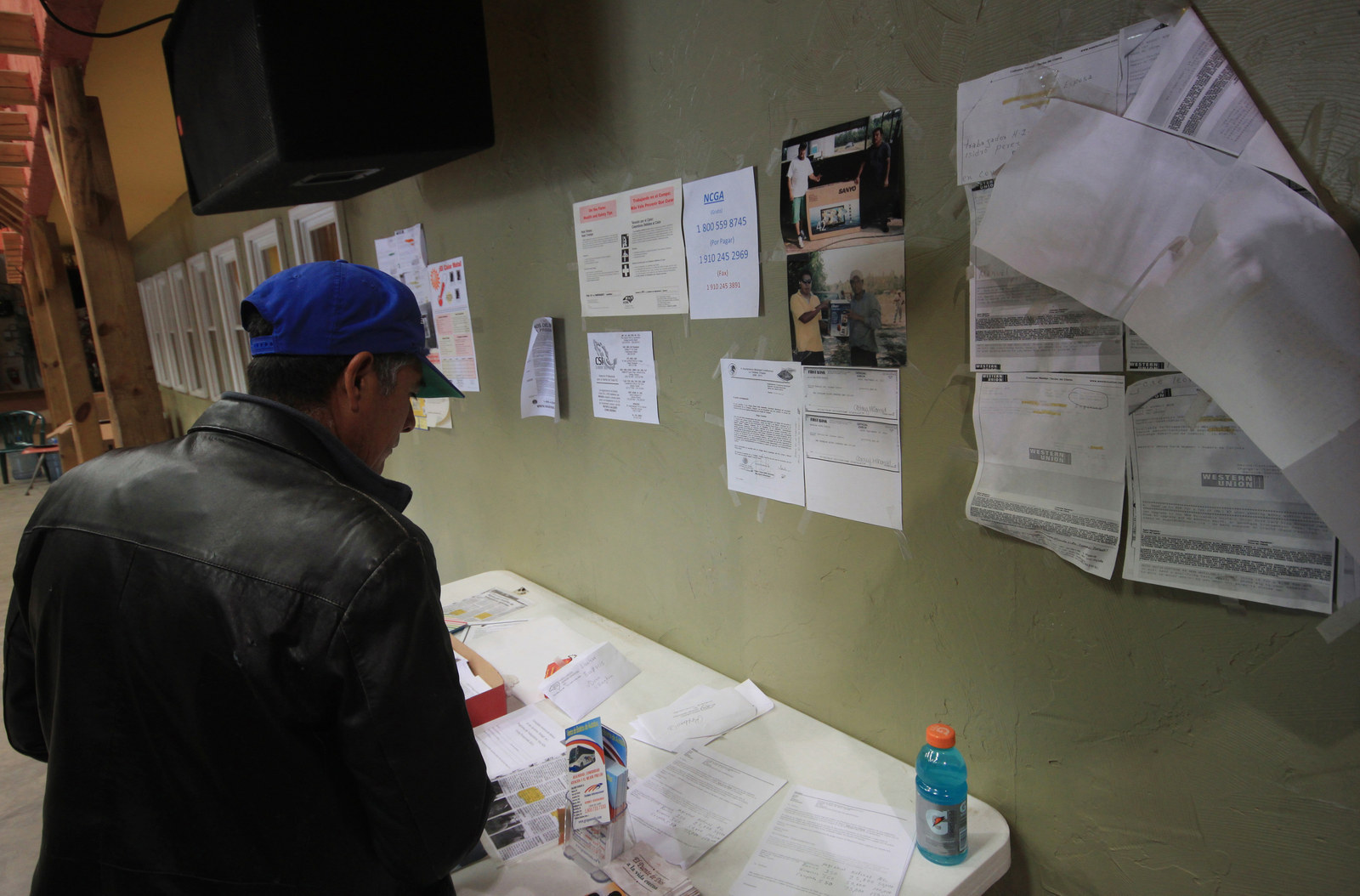
Four months later, in July, the company pleaded guilty and was ordered to shut down and forfeit $1.12 million to the government. The company’s lawyer, however, later told the judge that it would be able to pay back less than a third of that amount. Farrell was allowed to plead to two misdemeanor counts of referring unauthorized aliens for employment and to forfeit $16,300; her attorney argued that she and her husband are “not wealthy people.”
The prosecutor wanted a strict sentence for Farrell, but Judge Osteen — who had ruled in Eury’s favor when he sued the Labor Department a few years earlier — said Chut should have thought of that before he let her plead down to misdemeanors. Osteen gave Farrell a 9 p.m. curfew for four months, noting that she “may leave the house during the curfew time for purposes of maintaining the household or employment.”
Next, the grand jury added Wicker and White to the original indictment, charging that they, along with Eury, schemed to defraud clients and the government using ASAP and CSI, the companies they quietly controlled.
The Labor Department, however, didn't see a criminal indictment as any reason to stop featuring Wicker as an authority on how to faithfully abide by the law. Even after he had been formally charged, the Labor Department kept a video on its web site called “Cultivating Compliance,” which prominently featured Wicker explaining how agricultural employers can follow H-2 visa laws.
In a statement, a Labor Department spokesperson said that it “began a review of the video” after learning of Wicker’s indictment, finding that “much of the content was still valid and useful compliance assistance so we did not take it down right away.” After Wicker agreed to cooperate with the prosecution and pleaded guilty to a felony this April, “we removed the video,” the spokesperson said.
As for Eury, facing what had risen to 67 felony counts, he finally gave in and on June 23, 2015, pleaded guilty to two counts of conspiracy to defraud the U.S. government. White, 65, who did not respond to requests for comment, followed suit the next day.
“The whole operation was built on fraud," Judge Osteen said in court, "allowing these businesses to continue on using the lower wages of the foreign workers, even though they weren’t supposed to be here.”
But Eury’s whole operation was not dismantled. Far from it.
“The whole operation was built on fraud," the judge said.
The combined prison sentences of all the perpetrators totaled barely two years. Farrell, for one, served no time. In exchange for his cooperation, Wicker got just two months in custody, while a judge handed White five months behind bars. Each forfeited $220,000 to the federal government. Porter served five months in prison and got out in November, paying $300,000 in forfeiture and a $100,000 fine. And Eury, the mastermind behind the entire scheme, was forced to cough up $615,000, which his lawyer called “a challenge,” and was sentenced to 13 months at a federal prison in Salters, South Carolina. He reported on November 20 and is expected to get out just before Halloween 2016.
The Labor Department has the authority to debar employers or visa agents from applying for H-2 visas, and when International Labor Management pleaded guilty to 40 counts of visa and immigration fraud, the company agreed to “submit to permanent debarment.” But it took the Labor Department 10 days to follow through — and in that time the agency approved at least 12 of the company’s visa applications for a total of more than 400 workers.
Just two days after the formal debarment, employees of International Labor Management and the North Carolina Growers Association formed a new venture, National Agricultural Consultants. Since then, that new company has won approval for more than 5,100 H-2 visas, federal data show; its 10 largest clients had all previously gotten visas through International Labor Management.
At Farrell’s October 2014 sentencing, the judge said he expected her to be banned from the guest worker program, too, adding he would make it “a condition of whatever I do that she submit to debarment” and provide proof. But the Department of Labor has not debarred Farrell — or Eury, Wicker, White, or Porter.
In fact, the department let at least one of them carry on getting visas. On the same day that Wicker agreed to plead guilty to conspiracy to defraud the United States of America, he signed two applications on behalf of the North Carolina Growers Association. And he kept submitting the association’s visa applications for more than four months — 20 applications in all, for a total of 3,887 workers. The Labor Department approved every single one of them.
As for CSI and ASAP — the companies that Eury, Wicker, and White used in their conspiracy to defraud the United States — they are still raking in money. CSI continues to be one of the largest H-2 recruiters, helping to bring some 24,000 Mexican workers into the country last year. And with ASAP still under exclusive contract to bill CSI’s clients for the service, Eury would continue to profit even as he sits in federal prison.
The North Carolina Growers Association, the business at the root of Eury’s enterprise, has not been accused of a crime and is still going strong. Since Eury was first indicted, the association has won approval for at least 22,000 visas. Just this month it applied for at least 285 more — and those applications were signed by Warren Wicker, who co-founded the firm that has taken over much of International Labor Management’s visa business and who is Lee Wicker's brother.
In a statement, Hill wrote, “We can finally announce that the previously pending personal legal issues which were facing three of our former senior staff members are now concluded, and we are especially pleased to report that NCGA is moving forward in good standing with the government.”
Victims of Eury’s scheme — his clients — have largely stuck by him to get the visas they've come to rely on. Federal investigators interviewed many of them in the course of the probe. Some expressed surprise at the information presented to them but have kept on using the North Carolina Growers Association to get visas to this day, government records show. And the association continues to do a booming business.
Eury, for his part, has maintained that he’s simply the victim of a government vendetta and that his work on the H-2 program benefited everyone.
“My father taught me that I could do anything if I worked hard enough,” he said before a crowd of supporters who packed into the courtroom for his sentencing in late September. “I believed him, and I still do. I’ve lived the American dream.”



